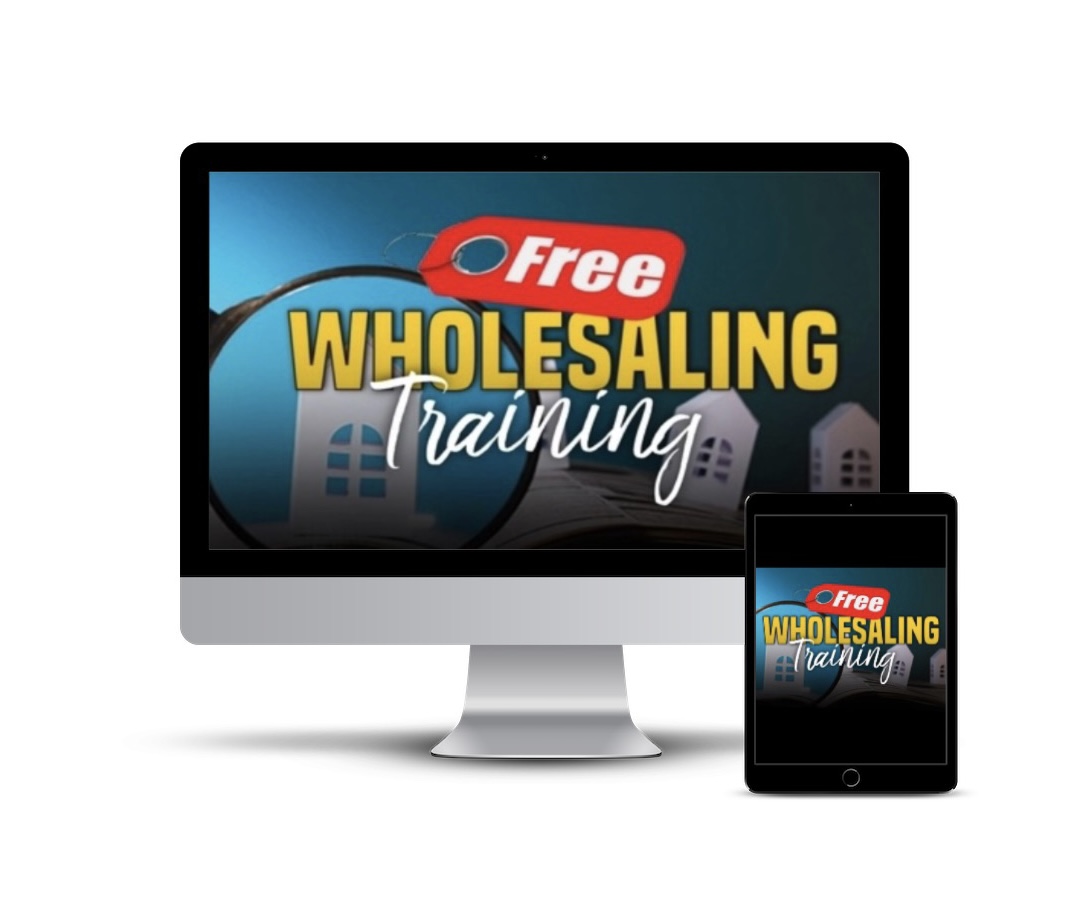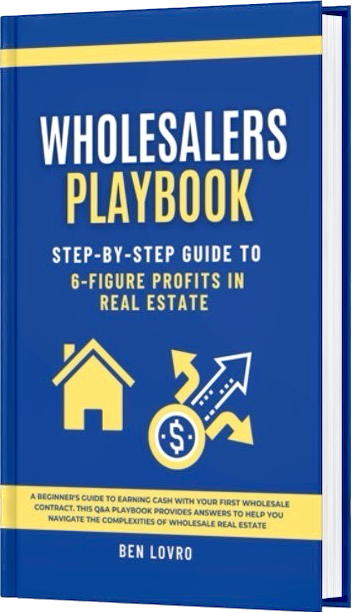FREE WHOLESALING COURSE
Get The Exact Blueprint To Launch And Grow A Successful Real Estate Wholesaling Business


What Is A Wholesale Contract, And How Does It Work?
Introduction
The concept of a wholesale contract is both fundamental and powerful. It serves as the linchpin of real estate wholesaling, a strategy where opportunities are seized, and profits are made without actually buying a property. This article will provide a comprehensive understanding of what a wholesale contract is and shed light on how it works.

The Essence of a Wholesale Contract
The essence of a wholesale contract lies in its role as a foundational element within the realm of real estate wholesaling. At its core, a wholesale contract is a legally binding agreement that serves as the linchpin of this innovative investment strategy. It solidifies the partnership between two key players: the property owner (referred to as the seller) and the investor or wholesaler (known as the buyer).
This agreement bestows upon the wholesaler a unique privilege – the temporary control and equitable interest in the property. The ultimate goal of this contractual arrangement is not to acquire the property itself but to secure the rights to the property for a defined period, typically a few weeks or months. During this window of opportunity, the wholesaler seeks to locate a subsequent buyer to whom they can assign their rights, all while ensuring a profitable margin for themselves.
Key components of a wholesale contract include the purchase price, earnest money deposit, assignment clause, and contingencies. The purchase price sets the stage for the financial aspect of the agreement, aiming to be attractive enough to pique the seller's interest. The earnest money deposit serves as a tangible symbol of good faith from the wholesaler, demonstrating their commitment to the transaction.
The assignment clause is the linchpin of the wholesale contract, allowing the wholesaler to transfer their rights and obligations under the contract to another buyer, known as the end buyer. Contingencies are conditions that must be met for the contract to remain valid, often including items like obtaining financing or conducting inspections.
The wholesale contract embodies the essence of real estate wholesaling – the art of securing opportunities, creating value, and profiting from property transactions without the necessity of property ownership. It stands as a testament to the creativity and flexibility inherent in the real estate industry, offering a pathway for both sellers and wholesalers to achieve their respective goals.
At its core, a wholesale contract is a legally binding agreement between a property owner (the seller) and an investor or wholesaler (the buyer). This agreement allows the wholesaler to gain control over the property, albeit temporarily, with the intention of selling the rights to another buyer for a profit.
Key Components of a Wholesale Contract
Purchase Price: This is the amount at which the wholesaler agrees to buy the property from the seller. It's essential for the purchase price to be attractive enough to entice the seller into the deal.
Earnest Money Deposit: To solidify the contract, the wholesaler typically provides earnest money as a show of good faith. This deposit is held in escrow until the deal is closed.
Assignment Clause: A crucial element of the wholesale contract, this clause allows the wholesaler to assign their rights and obligations under the contract to another buyer.
Contingencies: These are conditions that must be met for the contract to remain valid. Common contingencies include obtaining financing, conducting inspections, or ensuring clear title.
The Wholesale Contract Workflow
The wholesale contract workflow is the critical roadmap that guides the intricate dance of real estate wholesaling. It unfolds in a series of well-defined steps, each playing a pivotal role in the journey from identifying a potential deal to securing a profitable assignment.
The journey begins with lead generation, where wholesalers actively seek out motivated sellers and distressed properties. Once a promising lead emerges, the wholesaler conducts due diligence, thoroughly assessing the property's condition, market value, and potential for profit. This step ensures that the investment is viable and aligns with the wholesaler's objectives.
After the due diligence phase, negotiations commence. Here, the wholesaler and seller enter into discussions to agree on the purchase price and contract terms. Negotiation skills are paramount at this stage, as the wholesaler aims to secure the property at a price that allows for a profitable assignment to an end buyer.
Upon reaching an agreement, the wholesale contract is drafted and signed. This document formalizes the arrangement, specifying the purchase price, earnest money deposit, contingencies, and assignment clause. It is the linchpin of the entire process, granting the wholesaler control over the property and the right to assign the contract to an end buyer.
With the wholesale contract in hand, the wholesaler embarks on the crucial task of finding an end buyer. This involves marketing the deal to a network of investors, real estate professionals, and potential buyers. Once an interested party is found, the wholesaler negotiates the terms of the assignment, ensuring a profit margin for themselves in the process.
Finally, the wholesale contract is assigned to the end buyer, and the transaction is closed. The wholesaler receives their assignment fee, and the end buyer assumes control of the property, often proceeding with renovations or resale.
The wholesale contract workflow is a dynamic and strategic process that relies on market knowledge, negotiation prowess, and networking to turn potential real estate opportunities into profitable assignments. It is the heartbeat of wholesaling, offering a structured path to success in the world of real estate investment.
The journey of a wholesale contract typically follows these key steps:
1. Identifying a Motivated Seller
Wholesalers seek out motivated sellers, often individuals facing financial difficulties, distressed property owners, or those looking for a quick sale.
2. Negotiating the Contract
Once a potential property is identified, negotiations begin. The wholesaler aims to secure a purchase price well below market value to ensure room for profit.
3. Executing the Wholesale Contract
Upon successful negotiations, both parties sign the wholesale contract. The wholesaler may provide earnest money to demonstrate their commitment.
4. Finding an End Buyer
With the contract in hand, the wholesaler searches for an end buyer, typically an investor or another real estate professional.
5. Assigning the Contract
Using the assignment clause, the wholesaler assigns their rights under the contract to the end buyer in exchange for an assignment fee.
6. Closing the Deal
The end buyer finalizes the purchase with the original seller. The difference between the purchase price in the wholesale contract and the end buyer's purchase price represents the wholesaler's profit.
Benefits of Wholesale Contracts
Wholesale contracts in the realm of real estate investing offer a multitude of benefits, making them a vital tool for both novice and experienced investors. These contracts serve as the cornerstone of the wholesaling business model, enabling investors to capitalize on numerous advantages.
Wholesale contracts provide investors with control and flexibility. When a wholesaler secures a property under contract, they gain control over it without the obligation to purchase it themselves. This control allows them to market the property to potential buyers, giving them the flexibility to assign the contract to another investor for a fee. This strategy minimizes financial risk, as the wholesaler is not required to buy the property if they cannot find a suitable buyer.
Another significant benefit of wholesale contracts is the potential for substantial profits. Wholesalers can negotiate favorable terms with motivated sellers, securing properties below market value. When they assign the contract to an end buyer, they typically do so at a higher price, pocketing the difference as their assignment fee. This profit potential makes wholesaling an attractive avenue for real estate investors looking to generate income quickly.
Additionally, wholesale contracts foster a robust network of industry connections. Wholesalers frequently collaborate with motivated sellers, buyers, real estate agents, and fellow investors, expanding their professional network. This network can lead to future business opportunities, partnerships, and valuable industry insights.
Furthermore, wholesale contracts facilitate a streamlined and efficient transaction process. With a well-drafted contract in place, the terms and conditions of the deal are clearly defined, reducing the potential for misunderstandings or disputes. This clarity and transparency contribute to smoother transactions, benefiting all parties involved.
In summary, wholesale contracts offer investors control, profit potential, networking opportunities, and transaction efficiency. They are a fundamental tool in the world of real estate wholesaling, enabling investors to seize opportunities and build a thriving real estate business.
Wholesale contracts offer several advantages to both wholesalers and sellers:
Quick Transactions: Wholesale contracts can lead to faster property sales, providing sellers with much-needed liquidity.
No Financing Hurdles: Since wholesalers don't typically require financing, the deal is less likely to fall through to loan issues.
Profit Potential: Wholesalers have the opportunity to earn a profit without taking ownership of the property, making it a low-risk venture.
In summary, a wholesale contract is a pivotal tool in real estate wholesaling, enabling investors to profit from property transactions without the burden of ownership. Understanding its components and the workflow is essential for anyone seeking success in this niche of the real estate market.

Search Blog
Year
Month



